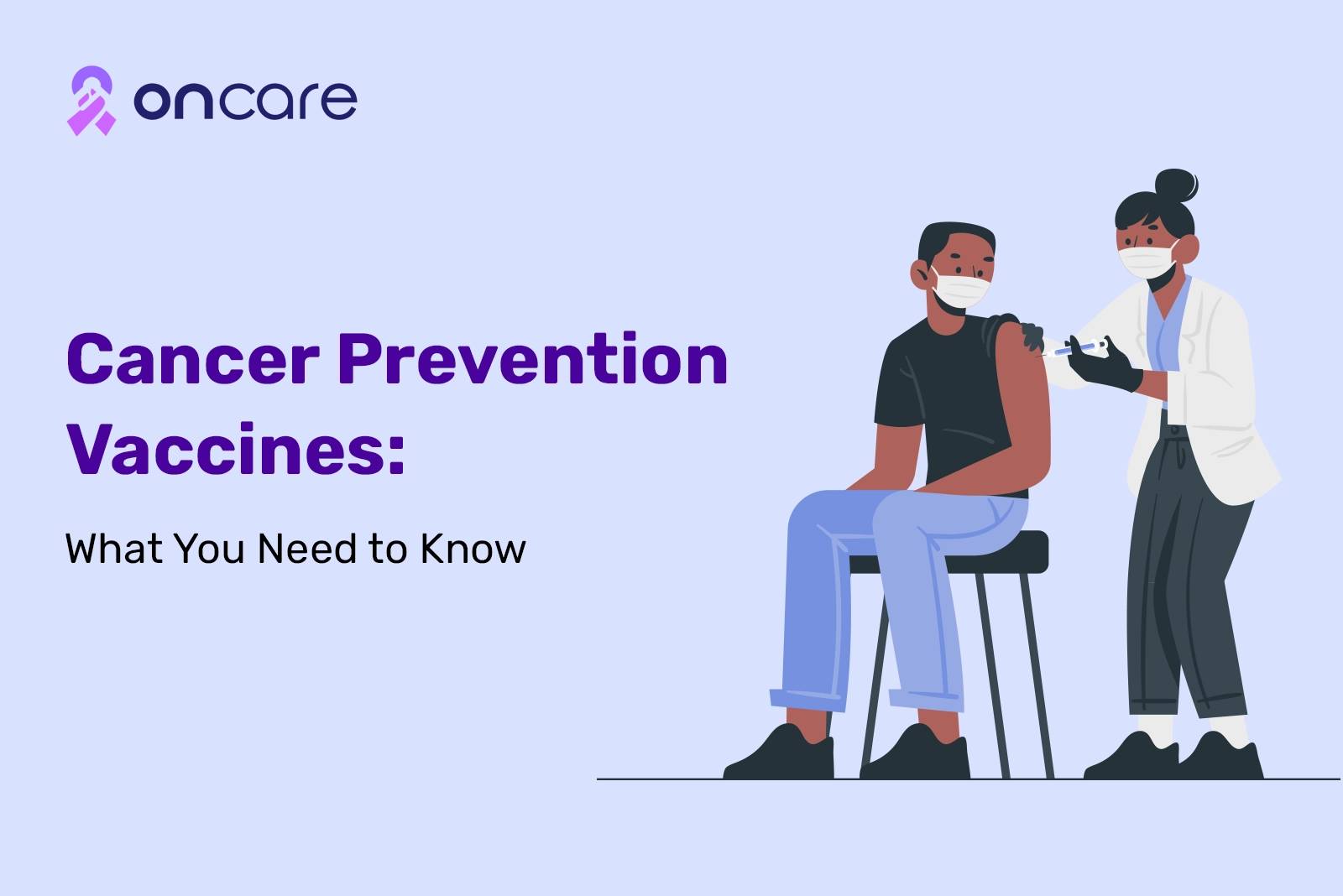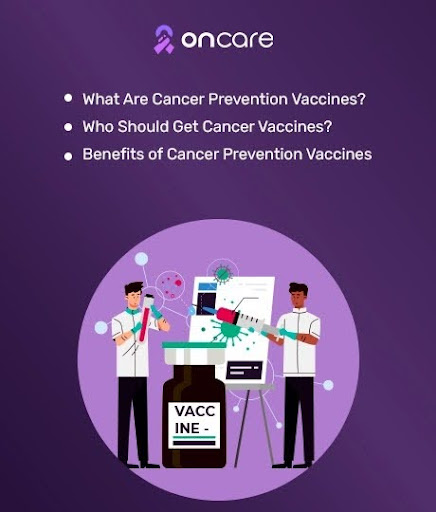Cancer Prevention Vaccines: What You Need to Know

Did you know that vaccines can significantly reduce the risk of developing certain cancers? Common vaccines like the cervical cancer vaccine and HPV vaccine and experimental breakthroughs like the breast cancer vaccine are revolutionizing cancer care by targeting the viruses and proteins that lead to malignancies. At Oncare, we are dedicated to making cancer prevention and treatment accessible, affordable, and effective. With over 15 years of expertise and more than 15,000 consultations, we ensure your cancer care journey is seamless and supported by experienced professionals.
So, today, in this article, let's learn how these vaccines work, what their costs are, and what the eligible age groups are while discovering why Oncare is your trusted partner for proactive health solutions.
What Are Cancer Prevention Vaccines?
Cancer prevention vaccines are specialized immunizations designed to protect against infections that can lead to cancer. These vaccines are a crucial tool in reducing the prevalence of cancers caused by viruses such as human papillomavirus (HPV) and hepatitis B. They work by prompting the immune system to recognize and combat these viruses before they cause harm. Let's explore the key types of cancer prevention vaccines and their impact.
HPV Vaccine (Gardasil, Gardasil 9, Cervarix)
The HPV vaccine is a groundbreaking immunization that prevents infection from high-risk strains of the human papillomavirus. This virus is a leading cause of cervical, anal, throat cancer and genital cancers. Vaccination is most effective when administered before exposure to the virus, ideally in adolescence. Gardasil 9, the most advanced version, offers protection against nine HPV strains responsible for the majority of HPV-related cancers.
>Hepatitis B Vaccine
Chronic hepatitis B infection is a significant risk factor for liver cancer. The hepatitis B vaccine effectively prevents this infection, making it an essential component of cancer prevention strategies. Administered as a series of three or four shots, this vaccine is recommended for infants, unvaccinated adults, and individuals in high-risk categories, such as healthcare workers or those with multiple sexual partners.
Cervical Cancer Vaccine
A specialized form of the HPV vaccine, the cervical cancer vaccine targets HPV strains directly linked to the majority of cervical cancer cases. Its timely administration can prevent up to 70% of these cancers. This vaccine is a pivotal tool in global public health efforts to eradicate cervical cancer.
Breast Cancer Vaccine (Under Development)
While not yet widely available, the breast cancer vaccine is an experimental immunotherapy aimed at preventing or treating breast cancer by targeting specific proteins associated with tumour growth. Clinical trials are ongoing, and early results indicate promising potential in reducing recurrence rates.

The Cost of Cancer Prevention Vaccines
The cost of cancer prevention vaccines varies based on the type and individual requirements. The HPV vaccine price in India typically ranges from 2,000 to 4,000 per dose, with the complete course requiring three doses, making the total cost between 6,000 and 12,000. For adults, the HPV vaccine cost can be slightly higher due to additional consultations. At Oncare, these vaccines are offered at discounted rates, ensuring affordability without compromising quality.
For those searching for "HPV vaccine near me," we provide seamless access to vaccination facilities with pricing transparency. The breast cancer vaccine, still under trial, may have a different pricing structure when approved, but we ensure up-to-date guidance and support regarding future availability and costs. Protect your health with affordable care at Oncare.
Who Should Get Cancer Vaccines?
Cancer prevention vaccines, such as the HPV vaccine and the cervical cancer vaccine, are crucial in reducing the risk of developing certain types of cancer. These vaccines are not just for young girls but are recommended for a wide range of individuals. Understanding who should receive these vaccines is key to preventing cancer before it can develop.
Children and Adolescents
The HPV vaccine is most effective when administered between the ages of 11 and 12. At this age, it provides long-term immunity before any potential exposure to the virus. Catch-up vaccination is recommended for those aged 13 to 26 who have not been vaccinated earlier.
Adults
Adults up to the age of 45 can benefit from the HPV vaccine, especially if they are at higher risk due to lifestyle factors or a history of multiple sexual partners. We at Oncare provide expert consultations to determine eligibility and guide patients on the best course of action.
Men
The HPV vaccine for men is crucial for preventing HPV-related cancers, including penile, anal, and throat cancers. Men of all eligible age groups can access vaccinations at Oncare for comprehensive protection.
High-Risk Individuals
People with a family history of cancer or compromised immune systems should consider cancer vaccines to reduce their risk. Vaccination is also recommended for those in close contact with individuals carrying cancer-causing viruses.
Benefits of Cancer Prevention Vaccines
Cancer prevention vaccines provide significant health benefits by targeting the root causes of certain cancers, reducing both individual and societal cancer burden. Here’s how these vaccines make a difference:
Reduces Cancer Risk
Vaccines like the HPV vaccine protect against the human papillomavirus, a primary cause of cervical, anal, and throat cancers. With high efficacy rates, the cervical cancer vaccine specifically helps in preventing approximately 70% of cervical cancer cases worldwide, which are linked to HPV infection.
Cost-Effective
Vaccines are a cost-efficient preventive measure compared to the often prohibitively expensive costs of cancer treatments such as chemotherapy, surgery, and radiation therapy. Early vaccination is far more affordable than cancer treatment, and widespread vaccination can lead to long-term healthcare savings by preventing costly cancer cases.
Long-Term Protection
A single dose of some vaccines, like the HPV vaccine, can offer protection for years as per HPV vaccine age. This reduces the need for costly interventions later in life. Research has shown that the HPV vaccine for adults, when administered early, can provide long-term immunity that lasts for a decade or more, lowering the lifetime risk of developing HPV-related cancers.
Public Health Impact
Vaccinating individuals reduces the prevalence of cancer-causing infections in the general population, leading to a collective decrease in cancer rates. As more people are vaccinated, the number of cancer cases in the community drops, improving overall life expectancy and reducing the healthcare burden.
Prevents HPV Transmission
HPV is one of the most common sexually transmitted infections and a major cause of several cancers. The HPV vaccine for men not only protects men from cancers such as penile and anal cancers but also prevents the spread of the virus to others, contributing to a reduction in HPV transmission rates.
Improves Quality of Life
By preventing cancer before it develops, vaccines help individuals avoid the physical, emotional, and financial toll cancer treatments often entail. People who are vaccinated are less likely to face the debilitating effects of cancer, maintaining a healthier lifestyle with fewer medical interventions.
At Oncare, we understand the importance of preventive care, which is why we offer accessible options for vaccines like the HPV injection at affordable prices, ensuring that more people can benefit from these life-saving vaccines.
Conclusion
Are you ready to take control of your health and prevent cancer effectively? Get your shot of cancer prevention vaccines like hepatitis B or HPV. These are generally safe to use and pretty well-tolerated. However, you may experience some mild symptoms like fatigue, low-grade fever, or soreness at the site of the injection.
Dealing with cancer may be overwhelming, but experienced care makes the journey easy. At Oncare Cancer, we combine advanced medical expertise with compassionate care to ensure you have access to effective cancer prevention strategies. From vaccinations to comprehensive oncology services, we are here to make your journey to better health smooth and hassle-free. Schedule your consultation today to take the first step toward a cancer-free future.
Frequently Asked Questions (FAQs)
The most common vaccines for cancer prevention are the HPV vaccine, which protects against several HPV-related cancers, and the Hepatitis B vaccine, which prevents liver cancer caused by hepatitis B infection.
While cancer vaccines are generally safe, some individuals may experience mild side effects like pain at the injection site, fever, or fatigue. Severe reactions are extremely rare, and our team ensures that patients are monitored for any adverse effects.
Challenges include lack of awareness, vaccine hesitancy, and accessibility issues. Oncare addresses these challenges by providing educational resources and affordable vaccine options, making preventive care accessible to all.
Cancer prevention vaccines activate the immune system to destroy virus-infected or abnormal cells before they become cancerous, effectively halting cancer cell growth at an early stage.
While cancers like pancreatic and advanced-stage lung cancer remain difficult to cure, early detection and prevention strategies, such as vaccination, greatly improve outcomes.
The HPV injection is used to prevent cancers caused by human papillomavirus, while the Hepatitis B vaccine prevents liver cancer caused by hepatitis B.
Preventive cancer treatment involves measures like vaccination, lifestyle modifications, and regular screenings to reduce the likelihood of cancer development.
Yes, many cancers can be prevented through vaccination, healthy lifestyle choices, and early medical interventions. At Oncare, we provide personalized preventive care plans tailored to individual risk factors.
Cancer's complexity, with variations in types, stages, and genetic mutations, makes it challenging to develop a universal cure. However, advances in prevention and early detection continue to improve survival rates.
Certain cancers have genetic links, but environmental factors, viruses, and lifestyle choices play significant roles. Preventive measures, including vaccines, can mitigate these risks effectively.